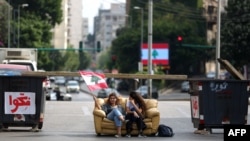According to the World Bank, Lebanon is experiencing one of the world’s worst manmade economic crises. In a country that once had a thriving middle class, two-thirds of its population now lives in poverty. There are food, power, and medicine shortages; inflation is soaring.
To help alleviate the suffering of the Lebanese people, in 2021, the United States provided more than $400 million in humanitarian assistance, in addition to more than $240 million in security assistance.
But unlike humanitarian crises caused by earthquakes, drought, or war, many of Lebanon’s problems stem from the corrosive effects of corruption, which the U.S. State Department in its latest human rights report on Lebanon called “endemic.” The report noted that it was accompanied by “impunity on a wide scale.”
Two years ago, the Lebanese people took to the streets by the tens of thousands to demonstrate against government mismanagement and corruption, but little has changed.
On October 28, the United States designated three Lebanese individuals who have undermined the rule of law and good governance in Lebanon in part by participating in corrupt acts or exploiting an official position to benefit themselves. Secretary of State Antony Blinken said in a written statement, “The United States is levying sanctions on these individuals in solidarity with the Lebanese people, who have long demanded accountability, transparency, and an end to endemic corruption.” The three are businessmen Jihad al-Arab and Dany Khoury, and a sitting member of Lebanon’s Parliament, Jamil Sayyed.
According to Secretary Blinken, al-Arab and Khoury “have used their close personal connections to political elites to reap the benefits of government contracts while failing to meaningfully fulfill those contracts’ terms.” Sayyed used his position “to skirt domestic banking policies,” and as a result was able to transfer $120 million to overseas investments in order to enrich himself.
The designations mean that all property and interests in property of these three individuals that are in the United States or under its jurisdiction are blocked. In addition, all transactions by U.S. persons that involve the property of the designated individuals are prohibited.
In its written announcement about the sanctions, the U.S. Treasury Department called for “swift implementation of economic reforms to stabilize the situation” in Lebanon, and it urged “the political class to break from the practices of political patronage and corruption and begin to prioritize the needs of the Lebanese people.”














